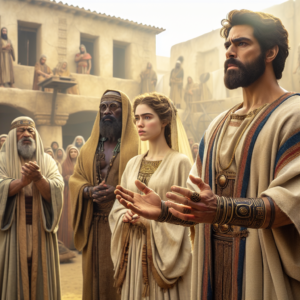Finding Eternal Beauty in The Picture of Dorian Gray
Imagine if your soul’s condition was reflected on your outward appearance. Oscar Wilde’s “The Picture of Dorian Gray” delves into a fascinating exploration of beauty, morality, and the consequences of our choices. But how does this relate to biblical principles? Let’s uncover the eternal beauty that comes from a life aligned with God’s word.
The Lure of Physical Beauty and Worldly Pleasures
Oscar Wilde’s narrative warns of the dangers in prioritizing physical beauty and earthly pleasures above all else. Dorian Gray, entranced by his own physical beauty and the hedonistic lifestyle suggested by Lord Henry, wishes for his portrait to bear the burden of age and sin, enabling him to live a life of unbridled indulgence.
Biblically, this mirrors the warning in 1 John 2:16 (NIV), “For everything in the world—the lust of the flesh, the lust of the eyes, and the pride of life—comes not from the Father but from the world.” As Christians, we are encouraged to seek beauty not in the flesh, but in the spirit.
The Consequences of Sin
As Dorian Gray’s portrait grotesquely transforms to reflect his corrupted soul, we see a vivid illustration of the wages of sin. His external beauty remains unmarred, yet his soul, hidden away, becomes increasingly disfigured.
Scripture explains this spiritual principle clearly. Romans 6:23 notes, “For the wages of sin is death, but the gift of God is eternal life in Christ Jesus our Lord.” Wilde’s story and the Bible agree: sin carries dire consequences, not always immediately visible.
Redemption and Transformation
Although “The Picture of Dorian Gray” has a tragic ending with Dorian facing the consequences of his choices, it serves as a stark reminder of the power of redemption offered through Christ. Unlike Dorian, we have hope.
2 Corinthians 5:17 (NIV) promises, “Therefore, if anyone is in Christ, the new creation has come: The old has gone, the new is here!” This verse encapsulates the transformative power of redemption—a beauty that emanates from within and is eternal.
Let us not be like Dorian, endlessly chasing fleeting earthly pleasures. Instead, may we seek the lasting beauty found in a life committed to God, embracing the transformation and redemption freely given to us through Christ.
Embrace Eternal Beauty
In reflecting on “The Picture of Dorian Gray” through a biblical lens, we are reminded of the importance of nurturing our inner beauty—that which is pleasing to God. We are called to live a life not of selfish pursuits, but one that reflects the beauty, love, and grace of our Creator.
Are you ready to embark on a journey towards lasting beauty and fulfillment? Turn to the Scriptures, engage in prayer, and let God’s transformational love refine your heart and soul. Embrace the eternal beauty found in a life lived for Him.
Call to Action:
Dear reader, as you ponder the themes discussed today, consider the state of your own heart. Are you chasing after things of the world, or are you seeking the enduring beauty found in Christ? We encourage you to dive deeper into your faith, explore the transformative power of God’s Word, and let it guide you to a life of true beauty and purpose.
If you want to learn how ANY book relates to Biblical principles, please try our Books and Scripture GPT. Simply type in the name of a book and let it show you insights you might not have been aware of!


